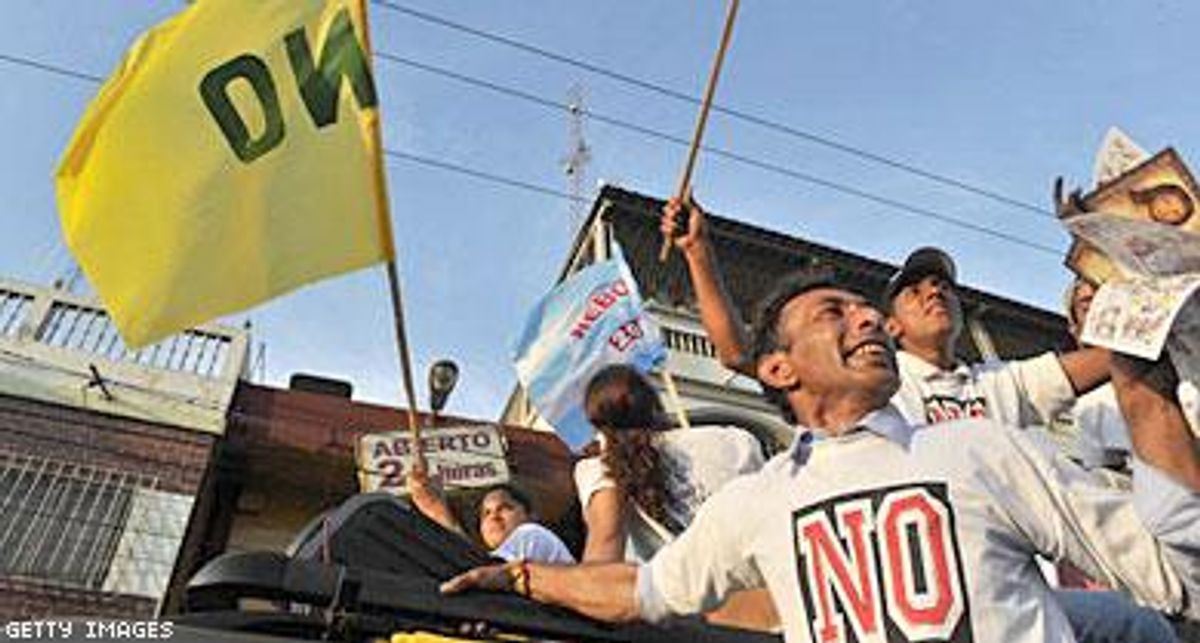In the lead-up to Ecuador's referendum vote on September 28, some conservatives have labeled a proposed constitution a mariconada (faggotry), complaining that the constitution refers to "families" instead of the unitary "family" and allows for gay marriage. The proposal actually restricts marriage to heterosexual couples but legalizes same-sex civil unions. The new language for this heavily Roman Catholic nation would also ban discrimination based on sexual orientation or gender identity.
LGBT activists are celebrating the proposed constitution as a major step forward, building off of a decade of victories. In 1997 the Constitutional Tribunal overturned a section of the Ecuadorian penal code that criminalized sexual activity between people of the same sex, six years before the U.S. Supreme Court voided sodomy laws. The next year, Ecuadorians approved the constitution that is currently in effect, becoming, according to the International Lesbian and Gay Association, the first country in the Western Hemisphere to ban discrimination based on sexual orientation.
LGBT activists like Leticia Rojas, a leader of Fundacion Causana, say the Catholic Church and other forces are trying to exploit homophobia to distract the public from pressing social and economic issues.
"The issues of abortion and homosexuality, gay marriage, are in my opinion just a front," she said. "They are using the referendum and the constitution to talk about moral issues, but in the end it has more to do with the church's economic interests."
Activists also accuse the church of initially giving the Constituent Assembly a green light on civil unions -- and then turning on the proposal. In an April letter to the assembly, the Ecuadorian Episcopal Conference said, "The stable union of a couple, regardless of their sex or sexual preference ... should generate the same rights and obligations [as marriage] under the law." And many Ecuadorian progressives say that the church has been hijacked by the right wing in recent years and is now closely aligned with political parties run by the economic elite, namely the Social Christian Party.
Many on the left, however, are critical of some of center-left president Rafael Correa's economic and environmental policies, particularly his support for large-scale mining. Correa was also criticized for intervening in the assembly to block proposals by leftist members of his party for increased indigenous rights and environmental protection. But most say that provisions such as increased access to education and universal social security make the constitution a clear step forward on issues of economic and social justice, not just gay and lesbian rights. For example, the article expanding the scope of "family" to "families" will benefit people outside of the LGBT population. It recognizes a variety of households, including those headed by single mothers, divided by immigration, or where the oldest sibling is the primary caretaker of his or her younger siblings.
But prominent supporters of the proposed constitution, led by Correa, are now downplaying the proposal's defense of LGBT rights. The government has run a number of ads emphasizing that the constitution limits marriage to heterosexual couples. Sandra Alvarez of the Ecuadorian Organization of Lesbian Women said that while groups are urging LGBT citizens to vote yes on the proposed constitution, they are keeping a low profile in front of the general public.
"We ... want to make our position clear but also don't want to weaken the process. This does not mean we are shying away from the debate -- we just don't want to generate headlines at the moment. Our struggle will be completely open and aggressive when it comes to the drafting of secondary laws."
The fight between President Correa and the leadership of the Catholic Church has also opened up fissures within the church. On September 15 the Ecuadorian Catholic Church, with evangelical preachers, held three open-air Masses in the coastal metropolis of Guayaquil to campaign against the constitution. Guayaquil archbishop Antonio Arregui, currently the leader of the Ecuadorian Catholic Church, is also an active member of the conservative Catholic organization Opus Dei. At the open-air Mass he said that God created heterosexual relationships as the basis of society.
"We ask that God's design is always recognized when man and woman were made, equally dignified and exactly complementary, so that they could help to strengthen society and become the source of new lives," he said.
But no open-air Masses took place in Quito, Ecuador's capital. Lay activist Xavier Guachamin said that dozens of progressive priests and laypeople promised a mass boycott if the leadership went ahead with a public mass to campaign against the constitution.
And on September 11 progressive priests from around the country released a statement denouncing "the actions of a sector of the church ... who have organized processions and open air masses, used religious images ... and taken advantage of the feelings and expressions of our people, supposedly as part of the teaching of the catechism, but really in clear alliance with the powerful sectors' political interests." Correa has called for churchgoers to stand up and denounce their priests if they lie about the constitution and say that it would legalize gay marriage.
Church officials declined an interview with The Advocate.
One major drawback of the constitution for LGBT people is a provision barring gay couples from adopting children. Activist Patricio Aguirre says that the state is essentially "institutionalizing homophobia." But he and others say the new legal protections far outweigh the drawbacks. And with polls showing more than 57% of people supporting the proposal, it looks like one of the most pro-LGBT constitutions in Latin America could become a reality.


















































































Fans thirsting over Chris Colfer's sexy new muscles for Coachella